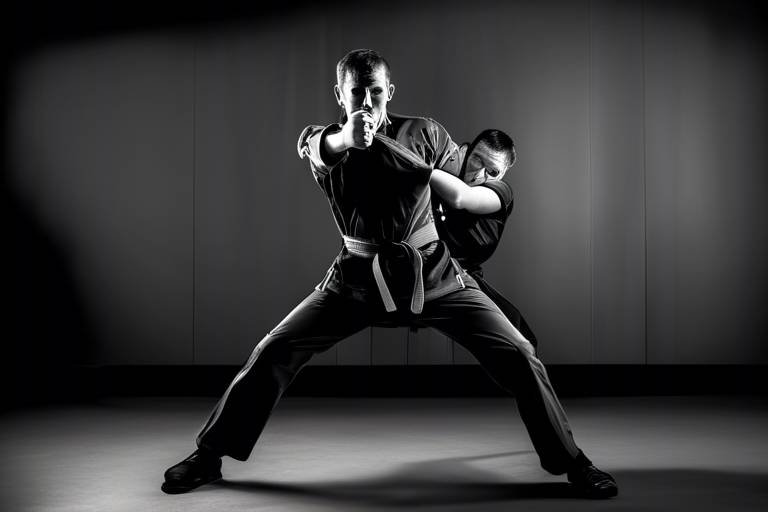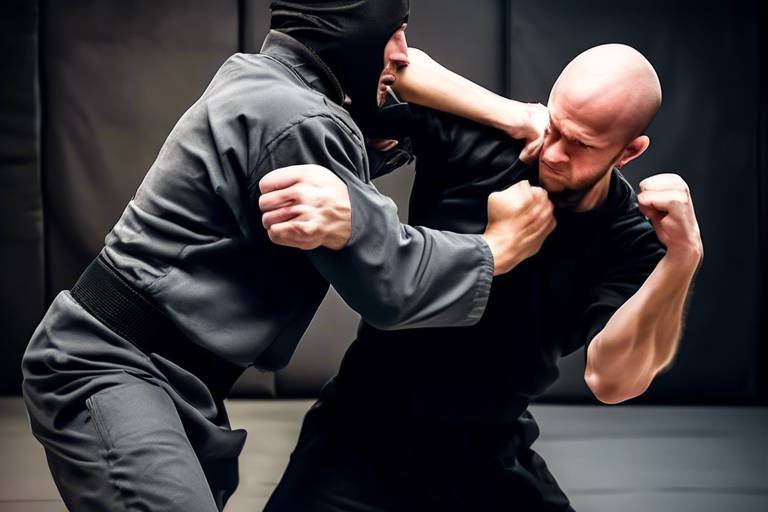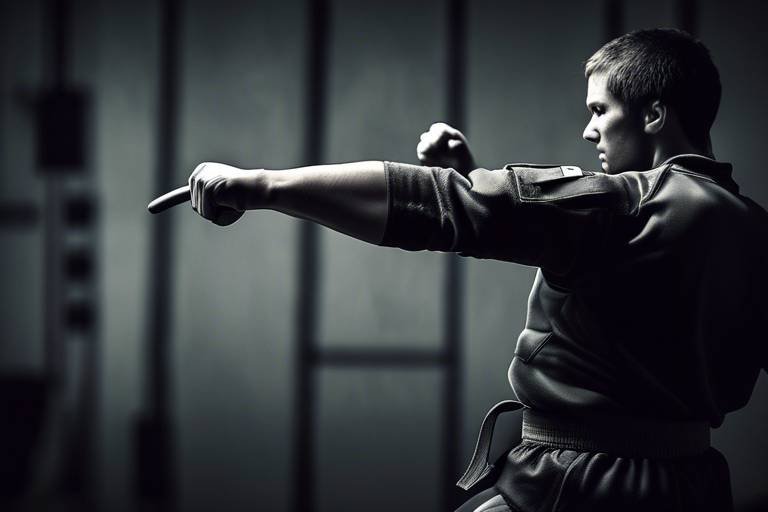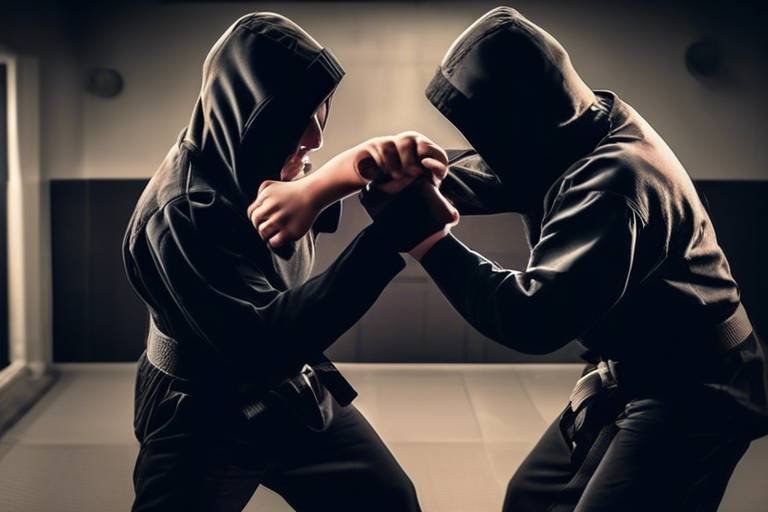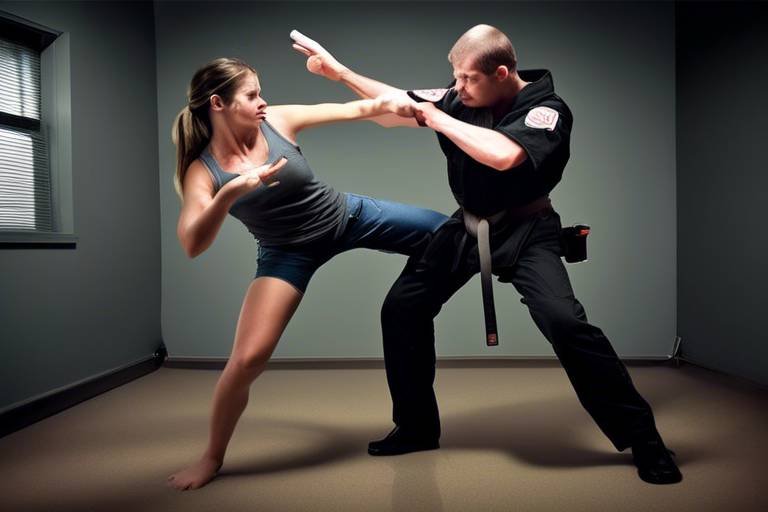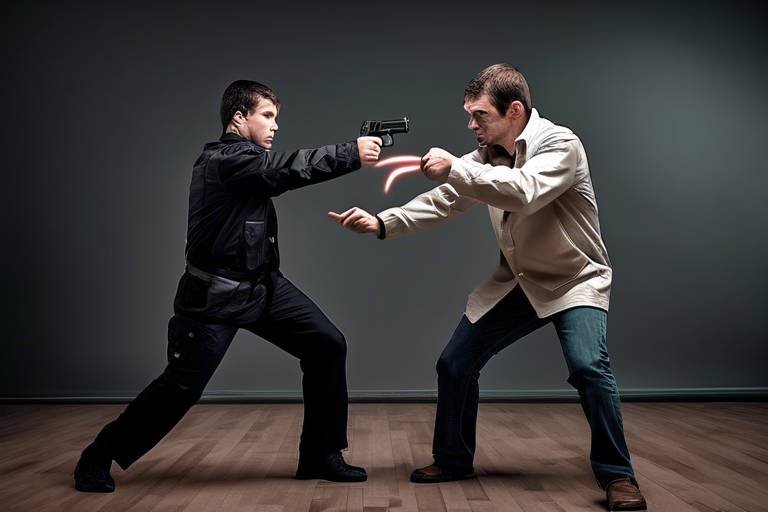Self-Defense Training: A Recreational Activity with Serious Benefits
Self-defense training is often perceived as simply a means to protect oneself from physical threats, but it encompasses much more than that. In today's fast-paced world, where stress and uncertainty loom large, engaging in self-defense can be a transformative experience. Not only does it equip individuals with the skills to defend themselves, but it also serves as a holistic approach to personal development. Imagine stepping into a dojo, feeling the energy of the space, and realizing that you are about to embark on a journey that will enhance your physical fitness, mental resilience, and social connections. This article delves into the multifaceted advantages of self-defense training, highlighting its significance as both a recreational pursuit and a valuable life skill.
Engaging in self-defense training significantly enhances physical fitness by improving strength, flexibility, and cardiovascular health. Think of it as a fun workout disguised as a self-protection class! Each session is packed with movements that challenge your body in various ways. From practicing kicks and punches to executing grappling techniques, the physical demands of self-defense training can lead to noticeable improvements in your overall fitness level. Not only do you get to learn practical skills, but you also enjoy a workout that keeps you engaged and motivated.
Consider the following physical benefits of self-defense training:
- Strength Building: Regular practice helps tone muscles and increase overall strength.
- Enhanced Flexibility: Many techniques require stretching and agility, which can improve your range of motion.
- Cardiovascular Health: The fast-paced nature of training gets your heart pumping, promoting a healthier cardiovascular system.
Self-defense training is not just about physical prowess; it also fosters mental resilience. Participants quickly learn that the journey involves overcoming challenges, which cultivates confidence, discipline, and stress management techniques. Imagine facing a sparring partner or executing a complicated move—each challenge faced in training helps to build a stronger mindset. This newfound mental fortitude can be applied in various life situations, from handling workplace stress to navigating personal challenges.
One of the most profound benefits of learning self-defense techniques is the empowerment it brings. As individuals master new skills, they experience a significant boost in self-confidence. Picture yourself effortlessly executing a self-defense maneuver; that sense of achievement translates into daily life, enabling you to face challenges more assertively. You start to see yourself not just as a participant in a class, but as someone capable of tackling life's hurdles head-on.
Through practice, individuals learn to confront their fears, transforming anxiety into empowerment. The dojo becomes a safe space where you can experiment, make mistakes, and grow. This process of facing fears enhances overall mental well-being, allowing you to approach other life situations with a newfound sense of bravery.
Self-defense training encourages quick thinking and effective decision-making. In a sparring match, decisions must be made in split seconds, honing your ability to react under pressure. These skills are invaluable and extend beyond the training environment, aiding in everyday scenarios where quick judgment is essential.
The physical activity involved in self-defense training serves as a great stress reliever. As you punch and kick, you release pent-up energy and frustration, allowing for a cathartic experience. This outlet for stress not only promotes physical fitness but also fosters a sense of enjoyment. You leave each class feeling rejuvenated, with a smile on your face and a sense of accomplishment.
Participating in self-defense classes offers opportunities for social interaction, allowing individuals to build connections and friendships within a supportive community. The camaraderie developed during training is invaluable. You share experiences, challenges, and victories with others who are on a similar journey, creating bonds that often last a lifetime.
Training with others creates a sense of camaraderie that extends beyond the dojo or training space. You find yourself surrounded by a group of individuals who encourage and uplift one another, making the experience more enjoyable and rewarding. This supportive network not only enhances your training but also enriches your social life.
Self-defense training often promotes inclusivity, welcoming individuals from diverse backgrounds and abilities. This creates an enriching environment for all participants. Whether you're a beginner or an experienced martial artist, everyone has a place in the dojo, making it a unique space for personal growth and shared experiences.
1. Is self-defense training suitable for everyone?
Yes! Self-defense training is designed to accommodate individuals of all ages and fitness levels. Whether you're a beginner or an experienced martial artist, there’s a place for you.
2. How often should I train to see benefits?
While even occasional training can be beneficial, attending classes 2-3 times a week is ideal for experiencing significant physical and mental improvements.
3. Can self-defense training help with anxiety?
Absolutely! The skills learned in self-defense training can help individuals manage anxiety and build confidence, providing tools to face fears head-on.

Physical Fitness Benefits
Engaging in self-defense training is not just about learning how to protect yourself; it’s a fantastic way to enhance your overall physical fitness. Think of it as a fun workout disguised as a skill-building activity. When you step onto the mat or the training floor, you're not just going through the motions; you're actively working on your strength, flexibility, and cardiovascular health. Each punch, kick, and maneuver requires energy and focus, which means you’re getting a full-body workout without even realizing it!
One of the most exciting aspects of self-defense training is how it incorporates various fitness elements. For instance, consider the following benefits:
- Strength Training: Many self-defense techniques involve using your body weight to strengthen your muscles. Whether you're practicing grappling or striking, you’ll find that your core, arms, and legs get a solid workout.
- Flexibility: Regular practice helps improve your flexibility. As you learn to execute high kicks or swift dodges, your body adapts, enhancing your range of motion.
- Cardiovascular Endurance: The fast-paced nature of self-defense drills elevates your heart rate, making it an excellent cardiovascular workout. You'll find yourself huffing and puffing while laughing with your training partners!
But the benefits don't stop there. Self-defense training also promotes better balance and coordination. As you learn to move quickly and efficiently, your body becomes more aware of its positioning and movements. This increased body awareness translates into better performance in other physical activities, whether you're playing sports, hiking, or just navigating daily life.
Moreover, self-defense training can be a great way to break the monotony of traditional workouts. Instead of staring at a wall while running on a treadmill, you’re actively engaging with others, learning new skills, and having fun. It’s like a two-for-one deal: you get to work out while also gaining valuable life skills! And let’s be honest, who doesn’t want to learn how to defend themselves while getting fit?
In summary, self-defense training is a dynamic and engaging way to improve your physical fitness. It's not just about learning to throw a punch or execute a perfect kick; it's about building a stronger, more resilient body that can handle whatever life throws at you. So, if you're looking for a way to stay active that also equips you with practical skills, self-defense might just be your new favorite pastime!

Mental Resilience Development
Self-defense training is not just about learning how to throw a punch or execute a perfect kick; it’s a powerful tool for developing mental resilience. In a world that often feels overwhelming, the ability to bounce back from challenges is invaluable. Engaging in self-defense activities helps individuals cultivate qualities such as confidence, discipline, and effective stress management. These skills are not confined to the dojo; they spill over into everyday life, enhancing one’s ability to face various situations with a calm and collected mindset.
One of the most profound aspects of self-defense training is its ability to boost self-confidence. When individuals learn and master self-defense techniques, they gain a sense of empowerment that translates into their daily interactions. Imagine walking down the street, knowing that you possess the skills to defend yourself if necessary. This newfound confidence can transform not just how you view yourself, but also how others perceive you. It’s like carrying an invisible shield of assurance!
Moreover, self-defense training teaches individuals to confront their fears head-on. The practice of facing potentially intimidating scenarios—whether it’s sparring with a partner or learning to defend against an attacker—can turn anxiety into empowerment. Each time a person steps onto the mat, they are not just practicing techniques; they are also overcoming personal barriers. This process can lead to significant improvements in overall mental well-being, as individuals learn to manage their fears rather than let them control their lives.
Additionally, self-defense training sharpens decision-making skills. In the heat of the moment, being able to think quickly and make effective choices is crucial. Training scenarios often require split-second decisions, which can translate into better judgment in real-life situations. This skill set is incredibly beneficial, whether you’re navigating a challenging work environment or making important personal decisions. Think of it as mental agility training—just as athletes train their bodies, self-defense practitioners train their minds.
Furthermore, the physical activity involved in self-defense serves as an excellent outlet for stress relief. The adrenaline rush from training can be exhilarating, allowing individuals to channel pent-up energy in a constructive way. It’s like hitting the reset button on your mental state! When you leave a training session, you often feel lighter and more relaxed, having released the tension that life can sometimes bring. This aspect of self-defense training not only enhances physical fitness but also contributes significantly to mental health.
In summary, self-defense training is a multifaceted approach to developing mental resilience. It empowers individuals by boosting self-confidence, helping them overcome fears, enhancing decision-making skills, and providing a healthy outlet for stress. So, if you’re looking for a way to not only learn practical skills but also strengthen your mental fortitude, self-defense training might just be the perfect fit for you!
- What age is appropriate to start self-defense training?
Self-defense training can be beneficial for individuals of all ages. Many programs cater to children, teenagers, and adults, each focusing on age-appropriate techniques and strategies.
- Do I need to be physically fit to start self-defense training?
No prior fitness level is required to begin self-defense training. Classes are designed to accommodate various fitness levels, and participants will gradually improve their physical condition as they train.
- How often should I train to see benefits?
Consistency is key! Training at least once or twice a week can lead to noticeable improvements in skills and mental resilience over time.

Boosting Self-Confidence
One of the most transformative aspects of self-defense training is its remarkable ability to boost self-confidence. Imagine stepping onto the mat for the first time, feeling a mix of excitement and anxiety. As you learn new techniques, practice them repeatedly, and gradually master them, you begin to notice a shift within yourself. This journey of learning is not just about physical prowess; it's about conquering your inner doubts and fears. Each punch, kick, and block you execute successfully acts as a stepping stone toward a more confident version of yourself.
As you immerse yourself in self-defense training, you start to recognize that confidence isn't about being the strongest or the fastest. Instead, it's about believing in your abilities and knowing that you can handle challenges that come your way. This newfound confidence spills over into other areas of your life. Whether it’s speaking up in a meeting, approaching someone new, or simply navigating daily challenges, you find yourself standing taller and facing situations with a renewed sense of assurance.
Moreover, self-defense training encourages individuals to set and achieve personal goals. Each milestone, whether it’s mastering a specific technique or earning a new belt, reinforces the idea that you are capable of growth and improvement. This process of goal-setting and achievement is crucial in building a strong foundation of self-confidence. It’s like climbing a mountain; with each step you take, you gain not just altitude but also a profound sense of accomplishment.
To illustrate this further, let's consider some of the key ways self-defense training boosts self-confidence:
- Skill Mastery: As you learn and refine your techniques, you gain a sense of mastery that enhances your confidence.
- Positive Feedback: Receiving encouragement from instructors and peers creates a supportive environment that fosters growth.
- Physical Fitness: Improved physical fitness contributes to a positive self-image, which is closely linked to self-confidence.
In essence, self-defense training is not merely about learning to protect oneself; it’s a powerful tool for personal development. It teaches you to confront challenges head-on, transforming fear into empowerment. By consistently pushing your limits, you cultivate a mindset that embraces challenges rather than shying away from them. This shift in perspective is invaluable, as it equips you with the resilience to face life’s uncertainties with confidence.
So, the next time you find yourself hesitating to take on a new challenge, remember the strength you’ve built through self-defense training. Embrace the journey, and let your confidence soar!

Overcoming Fear
Fear is a natural human emotion, often creeping in when faced with the unknown. In the context of self-defense training, this emotion can be particularly pronounced. However, one of the most profound benefits of engaging in self-defense is the opportunity it provides to confront and ultimately overcome these fears. Imagine stepping onto the training mat for the first time, your heart racing, palms sweating, and a million questions swirling in your mind. Will I be good enough? What if I fail? These thoughts are common, but they can be transformed into stepping stones towards empowerment.
As you immerse yourself in the techniques and movements, something magical happens. With each punch, kick, and defensive maneuver, you start to dismantle the barriers that fear has erected. You learn to recognize that fear doesn’t have to paralyze you; instead, it can be a catalyst for growth. The more you practice, the more you realize that your body is capable of much more than you ever imagined. This realization is akin to peeling back layers of an onion—each layer revealing a stronger, more confident you.
Moreover, the supportive environment of self-defense classes plays a crucial role in this journey. Instructors and fellow trainees are often there to encourage you, share their own experiences, and help you navigate your fears. This camaraderie creates a sense of belonging, where vulnerability is not just accepted but embraced. You’re not alone in this; everyone is on their own path towards overcoming their fears. Together, you can celebrate small victories, whether it's successfully executing a technique or simply showing up for class.
Additionally, self-defense training teaches valuable skills that extend beyond the dojo. For instance, you learn to assess threats, make quick decisions, and respond effectively under pressure. These skills translate into real-life scenarios, giving you the confidence to handle unexpected situations. Imagine walking down the street, and a sudden noise makes your heart race. Instead of freezing, you draw upon your training to assess the situation calmly. This ability to respond rather than react is a powerful tool in overcoming fear.
Ultimately, overcoming fear through self-defense training is about transformation. It’s about shifting your mindset from one of apprehension to one of empowerment. Each class is an opportunity to face fears head-on, learn from them, and emerge stronger. As you continue this journey, you’ll find that fear becomes less of a daunting shadow and more of a guide, illuminating your path towards resilience and strength.
- How long does it take to overcome fear in self-defense training? The timeline varies for everyone. Regular practice and supportive training environments can expedite the process.
- Is self-defense training suitable for all ages? Absolutely! Self-defense training can be adapted for individuals of all ages and fitness levels.
- What if I don't feel physically fit enough to start? Self-defense classes often cater to various fitness levels. The focus is on personal growth and skill development.
- Will I learn practical self-defense skills? Yes! Self-defense training equips you with practical techniques that can be applied in real-life situations.

Decision-Making Skills
Self-defense training is not just about learning how to throw a punch or execute a kick; it’s about honing your under pressure. Imagine being in a high-stress situation where every second counts. The ability to make quick, effective decisions can be the difference between safety and danger. During training, practitioners are often placed in simulated scenarios that require them to assess their surroundings, evaluate threats, and respond swiftly. This dynamic environment cultivates a mindset that is not only reactive but also proactive.
Furthermore, the practice of self-defense encourages individuals to think critically and strategically. Each technique learned is accompanied by a series of decisions: When to engage? When to retreat? How to use the environment to your advantage? These questions foster a deeper understanding of situational awareness. Participants learn to analyze their options quickly and choose the best course of action, which is a skill that transcends the dojo and can be applied in everyday life, from navigating interpersonal conflicts to making important life choices.
The importance of decision-making skills in self-defense training can be summarized in the following ways:
- Enhanced Situational Awareness: Participants develop a keen sense of their environment, enabling them to spot potential threats before they escalate.
- Improved Problem-Solving Skills: Learning self-defense involves overcoming various challenges, which sharpens an individual's ability to solve problems efficiently.
- Increased Confidence in Decision-Making: As practitioners become more skilled, their confidence in making decisions—both in and out of training—grows significantly.
This ability to think on your feet is invaluable. Whether you’re faced with an unexpected challenge at work or a difficult decision in your personal life, the skills developed through self-defense training provide a framework for approaching problems with clarity and decisiveness. So, not only are you learning how to defend yourself physically, but you’re also building a mental toolkit that can help you navigate life’s complexities with greater ease.
Q1: How does self-defense training improve decision-making skills?
A1: Self-defense training places individuals in scenarios that require quick thinking and assessment of their surroundings, enhancing their ability to make effective decisions under pressure.
Q2: Can these decision-making skills be applied outside of self-defense situations?
A2: Absolutely! The critical thinking and situational awareness developed during training can be invaluable in various aspects of life, including work and personal relationships.
Q3: Is self-defense training suitable for everyone?
A3: Yes! Self-defense training welcomes individuals from all backgrounds and fitness levels, promoting inclusivity and community building.

Stress Relief and Enjoyment
Engaging in self-defense training is not just about learning to protect yourself; it’s a dynamic way to blow off steam and find joy in physical activity. Think about it: when you step onto the mat or into the training area, you're not only preparing your body for action but also giving your mind a much-needed break from the daily grind. The adrenaline rush that comes from practicing techniques or sparring with a partner can be incredibly liberating. It's like releasing a pressure valve—suddenly, you feel lighter and more energized.
Moreover, the physical exertion involved in self-defense training acts as a natural stress reliever. When you punch, kick, or grapple, your body releases endorphins, the feel-good hormones that can lift your mood and reduce feelings of anxiety. It’s a win-win situation: you’re getting fit while simultaneously battling stress. Imagine the satisfaction of landing a perfect technique or mastering a new move; it’s not just about self-defense; it’s a source of joy and accomplishment.
In addition to the physical benefits, self-defense training fosters a sense of community and belonging. When you train with others, you share in the struggles and triumphs, creating bonds that can turn into lasting friendships. The laughter and camaraderie that emerge during training sessions can add a social dimension that enhances the overall experience. It’s like being part of a team where everyone supports each other, making the journey enjoyable and fulfilling.
So, if you’re looking for a way to relieve stress while having fun, self-defense training might just be the perfect solution. You’re not only learning valuable skills but also embracing a lifestyle that prioritizes mental well-being through enjoyment and physical activity. Why not give it a shot? You might discover a newfound passion that transforms your approach to stress and leisure!
- What age is appropriate for self-defense training? Self-defense training can be beneficial for all ages, from children to seniors. Classes are often tailored to suit different age groups.
- Do I need prior experience to start self-defense training? No prior experience is necessary! Most classes welcome beginners and provide foundational skills to get you started.
- How often should I train to see benefits? Training two to three times a week can help you build skills and see improvements in fitness and confidence.
- Is self-defense training safe? Yes, when conducted in a controlled environment with qualified instructors, self-defense training is designed to prioritize safety while learning effective techniques.

Social Interaction and Community Building
Participating in self-defense classes is not just about learning how to protect oneself; it's also a fantastic avenue for social interaction and community building. Imagine walking into a dojo filled with people who share a common goal: to learn, grow, and empower themselves. The energy in the room is palpable, and before you know it, you’re not just a participant; you're part of a vibrant community. This environment fosters connections that often extend beyond the mats, creating friendships that can last a lifetime.
When you train alongside others, you build a sense of camaraderie that is hard to replicate in other recreational activities. You sweat together, struggle through challenging drills, and celebrate each other’s victories, big and small. This shared experience creates bonds that are rooted in mutual respect and understanding. In many ways, it's like being part of a team sport, but with a unique twist that emphasizes personal growth and self-improvement.
Moreover, self-defense training often promotes inclusivity, welcoming individuals from diverse backgrounds and abilities. This diversity enriches the learning experience, as participants bring different perspectives and skills to the table. Whether you're a seasoned martial artist or a complete novice, the dojo is a place where everyone can feel valued and included. This environment not only enhances learning but also nurtures a community spirit that encourages everyone to push their limits and achieve their goals.
In addition to fostering friendships, self-defense classes provide opportunities for networking. Many practitioners find that the connections they make in class lead to collaborations and support outside of training. This can be particularly beneficial in today’s fast-paced world, where having a strong support network can make all the difference in personal and professional endeavors. Imagine being able to count on a group of like-minded individuals who are there to cheer you on, offer advice, or simply lend an ear when you need it most.
Furthermore, social interaction in self-defense training can lead to enhanced mental well-being. Engaging with others in a supportive environment helps to reduce feelings of isolation and anxiety. The shared laughter, encouragement, and occasional friendly competition create a positive atmosphere that can lift spirits and improve overall happiness. In essence, self-defense training is not just about self-protection; it’s about building a community that supports each other in various aspects of life.
- What should I wear to self-defense classes?
Comfortable athletic wear is recommended to allow for ease of movement. Many practitioners also prefer wearing martial arts uniforms, but it’s not mandatory. - Is self-defense training suitable for all ages?
Absolutely! Self-defense classes cater to individuals of all ages and abilities. Many schools offer specialized classes for children, teens, and seniors. - How long does it take to become proficient in self-defense?
Proficiency varies by individual, but consistent practice can lead to noticeable improvements in a few months. Remember, the journey is just as important as the destination! - Can self-defense training help with confidence?
Yes! Many participants report a significant boost in self-confidence after training, as they learn to trust their abilities and face challenges head-on.

Building a Supportive Network
When you step onto the mat for self-defense training, you’re not just there to learn moves and techniques; you’re also entering a vibrant community filled with individuals who share similar goals and aspirations. This supportive network can be incredibly impactful, creating bonds that often extend beyond the dojo. Think about it: how often do you find yourself in a space where everyone is cheering for your success, celebrating your victories, and encouraging you through your struggles? It’s like being part of a family that thrives on mutual respect and growth.
In self-defense classes, you’ll encounter a diverse group of people, each bringing their unique backgrounds, experiences, and perspectives. This diversity enriches the training experience, allowing you to learn not just from your instructors but also from your fellow students. As you practice together, you’ll share stories, tips, and encouragement, which fosters a sense of belonging. The friendships formed in this environment can lead to a powerful support system, both inside and outside the training space.
Moreover, the camaraderie developed in self-defense training can help alleviate feelings of isolation that many people face in their daily lives. When you train with others, you create a safe space where everyone is working towards personal improvement, which can be incredibly motivating. Whether it’s celebrating a new belt promotion or just sharing a laugh after a tough sparring session, these moments contribute to a sense of community that is hard to find elsewhere.
Additionally, many self-defense schools host social events, workshops, and seminars that further strengthen these connections. Participating in these activities not only enhances your skills but also allows you to interact with a broader range of individuals who share your interests. This can lead to friendships that last a lifetime, creating a network of like-minded people who can support each other in various aspects of life.
In summary, self-defense training offers more than just physical skills; it provides a platform for building a supportive network that can positively influence your life. By engaging with others in this shared journey, you’ll discover that the benefits extend far beyond the training mat, creating lasting relationships and a sense of community.
- What should I wear to self-defense classes? It's best to wear comfortable athletic clothing that allows for movement. Some classes may require specific gear, so always check with your instructor.
- Is self-defense training suitable for all ages? Absolutely! Self-defense training is designed for individuals of all ages and fitness levels.
- How often should I train to see improvements? Consistency is key. Training at least twice a week can lead to noticeable improvements in your skills and confidence.
- Do I need prior experience to join a self-defense class? No prior experience is necessary! Most classes welcome beginners and will teach you everything you need to know.

Encouraging Inclusivity
One of the most beautiful aspects of self-defense training is its inherent encouragement of inclusivity. In a world that often feels divided, self-defense classes stand as a beacon of unity, welcoming individuals from all walks of life. Whether you're a seasoned athlete or someone just starting their fitness journey, the dojo or training space is a place where everyone can feel at home. Imagine stepping onto the mat and realizing that you share this space with people of different ages, backgrounds, and abilities. This diversity not only enriches the training experience but also fosters a sense of belonging.
Self-defense training is not just about learning how to protect oneself; it's about building a community where everyone feels valued and supported. In many classes, you'll find a mix of people, from college students seeking confidence to parents looking to learn practical skills for their families. This variety creates an environment where everyone can learn from each other, sharing experiences and insights that enhance the overall training process. Instructors often emphasize mutual respect and teamwork, ensuring that each participant feels included, regardless of their starting point.
Moreover, many self-defense programs actively seek to promote inclusivity by offering classes tailored for specific groups. For instance, women’s self-defense workshops, classes for seniors, and sessions for individuals with disabilities are becoming increasingly common. These specialized classes allow participants to learn in a safe and supportive environment, addressing their unique needs and concerns. Here’s a quick look at how these programs can be structured:
| Program Type | Target Audience | Focus Areas |
|---|---|---|
| Women’s Self-Defense | Women of all ages | Awareness, avoidance, and physical techniques |
| Seniors’ Self-Defense | Older adults | Personal safety, mobility exercises |
| Adaptive Self-Defense | Individuals with disabilities | Customized techniques and strategies |
This commitment to inclusivity not only empowers participants but also fosters a culture of acceptance and understanding. When individuals train together, they break down barriers and stereotypes, learning to appreciate the unique strengths each person brings to the table. It's this shared journey that transforms a simple class into a vibrant community, where friendships blossom and support systems are built. In essence, self-defense training becomes a powerful tool for social change, promoting a more inclusive society.
- What should I wear to self-defense classes? Comfortable athletic wear is recommended, along with supportive footwear.
- Do I need any prior experience? No prior experience is necessary; classes are designed for all skill levels.
- How long do self-defense classes typically last? Classes usually range from 60 to 90 minutes, depending on the program.
- Can I bring a friend to class? Absolutely! Many programs encourage bringing a friend for added support and motivation.
- Is self-defense training safe? Yes, safety is a top priority, and instructors focus on teaching techniques that minimize risk.
Frequently Asked Questions
- What are the physical benefits of self-defense training?
Self-defense training significantly boosts your physical fitness. It enhances strength, flexibility, and cardiovascular health. Plus, it’s a fun way to stay active while learning practical skills that could come in handy in real-life situations.
- How does self-defense training improve mental resilience?
Engaging in self-defense helps build mental resilience by fostering confidence and discipline. It teaches stress management techniques that are valuable in everyday life, allowing you to handle challenges more effectively.
- Can self-defense training really boost my self-confidence?
Absolutely! Learning self-defense techniques empowers you and boosts your self-confidence. This newfound confidence can help you face daily challenges more assertively and with a positive mindset.
- What if I’m afraid of getting hurt during training?
It’s completely normal to have fears about self-defense training. However, as you practice, you’ll learn to confront those fears and transform anxiety into empowerment, enhancing your overall mental well-being.
- Will I learn decision-making skills through self-defense?
Yes! Self-defense training encourages quick thinking and effective decision-making. These skills are not only crucial during training but also beneficial in various aspects of your life.
- Is self-defense training a good way to relieve stress?
Definitely! The physical activity involved in self-defense serves as a fantastic stress reliever. It provides an outlet for pent-up energy and frustration while fostering enjoyment and a sense of accomplishment.
- How does self-defense training promote social interaction?
Participating in self-defense classes creates opportunities for social interaction. You can build connections and friendships within a supportive community, making your training experience even more rewarding.
- Is self-defense training inclusive for everyone?
Yes! Self-defense training often promotes inclusivity, welcoming individuals from diverse backgrounds and abilities. This creates an enriching environment where everyone can learn and grow together.




